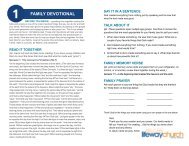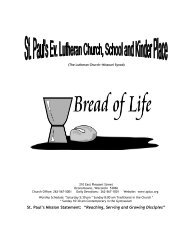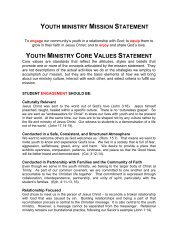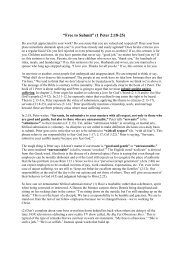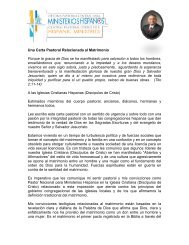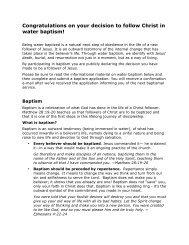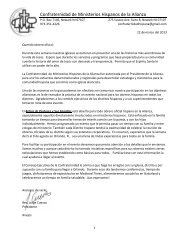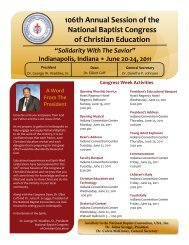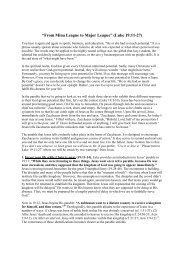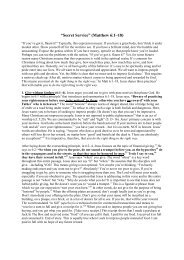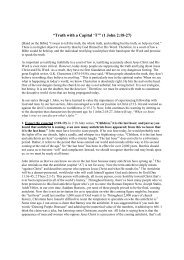“Transformed: More Than Meets the Eye” (Romans 12 - Razorplanet
“Transformed: More Than Meets the Eye” (Romans 12 - Razorplanet
“Transformed: More Than Meets the Eye” (Romans 12 - Razorplanet
Create successful ePaper yourself
Turn your PDF publications into a flip-book with our unique Google optimized e-Paper software.
<strong>“Transformed</strong>: <strong>More</strong> <strong>Than</strong> <strong>Meets</strong> <strong>the</strong> <strong>Eye”</strong> (<strong>Romans</strong> <strong>12</strong>:1–2)<br />
“Therefore I urge you, brethren, by <strong>the</strong> mercies of God, to present your bodies a living and holy<br />
sacrifice, acceptable to God, which is your spiritual service of worship. And do not be conformed to<br />
this world, but be transformed by <strong>the</strong> renewing of your mind, so that you may prove what <strong>the</strong> will<br />
of God is, that which is good and acceptable and perfect.” These are some of <strong>the</strong> most important and<br />
strategic words ever penned in human history. 1 They serve as a halftime address—a coach’s “chalk talk.”<br />
Paul’s words in Rom <strong>12</strong>:1–2 are capable of leading God’s people to victory. But please don’t let your<br />
familiarity with <strong>the</strong>se verses lead to passivity. Study <strong>the</strong>m anew and afresh. If you do, God will transform<br />
you from <strong>the</strong> inside out.<br />
After devoting eleven chapters to heavy-duty <strong>the</strong>ology, Paul transitions in chapter <strong>12</strong> from doctrine to<br />
duty, from creed to conduct, and from belief to behavior. 2 He says, “In light of what God has done, here<br />
is how we should live.” 3 To put it ano<strong>the</strong>r way, <strong>the</strong> apostle encourages us to turn our <strong>the</strong>ology into<br />
“walkology.” In o<strong>the</strong>r words, we are to live out our beliefs. Paul uses <strong>the</strong> imperative thirteen times in <strong>the</strong><br />
first eleven chapters of <strong>Romans</strong>; he uses it eleven times in chapter <strong>12</strong> alone! 4 In fact, this chapter has<br />
more commands in it than any o<strong>the</strong>r chapter of <strong>the</strong> New Testament. It is a chapter of action! Paul’s <strong>the</strong>sis<br />
is: Beliefs should impact behavior. In <strong>12</strong>:1–2 he shares two appropriate responses to <strong>the</strong> <strong>the</strong>ology of<br />
chapters 1–11. 5<br />
1. Present your body (<strong>12</strong>:1). This verse is one of <strong>the</strong> most important in <strong>the</strong> entire Bible and contains<br />
more key <strong>the</strong>ological terms and truths for its size than perhaps any o<strong>the</strong>r verse of Scripture. 6 Verse 1<br />
gives <strong>the</strong> “what” that we are to do in response to God. Paul opens this new unit with <strong>the</strong> word<br />
“Therefore” (oun). 7 This important word begs <strong>the</strong> question: What is <strong>the</strong> word “<strong>the</strong>refore” <strong>the</strong>re for?<br />
“Therefore” looks back to all <strong>the</strong> doctrine that Paul has covered in chapters 1–11. 8 It is a “call to arms,”<br />
for <strong>the</strong> most important part of doctrine is <strong>the</strong> first two letters. Paul believes that you haven’t really<br />
learned <strong>the</strong> Word until you live <strong>the</strong> Word. How well have you learned <strong>the</strong> Word? Have you been<br />
applying <strong>the</strong> truths of <strong>Romans</strong>? When you study <strong>the</strong> Bible on your own, do you bring it to bear on your<br />
life? Are you just a hearer of <strong>the</strong> Word or are you a doer of <strong>the</strong> Word? 9 Only when you become a doer of<br />
<strong>the</strong> Word, have you truly learned <strong>the</strong> Word.<br />
Paul writes, “I urge you, 10 brethren, by <strong>the</strong> mercies of God.” Instead of a command or a demand, Paul<br />
urges, or better yet, exhorts his readers (see NET). 11 The verb parakaleo denotes a sense of urgency with<br />
a note of authority (cf. <strong>12</strong>:8; 15:30; 16:17). <strong>12</strong> This term was used in classical Greek of “exhorting troops<br />
who were about to go into battle.” What a great word picture of <strong>the</strong> Christian life where God is our<br />
general and we are enlisted in a spiritual battle. Although parakaleo is a strong word, it is worth noting<br />
that <strong>the</strong> noun form (paraklete) is used to describe <strong>the</strong> Holy Spirit who comforts, encourages, and exhorts.<br />
Paul functions as a Christian coach who challenges and encourages us to reach a particular goal. There is<br />
fur<strong>the</strong>r tenderness in this appeal, for Paul speaks as a Christian bro<strong>the</strong>r to o<strong>the</strong>r Christian bro<strong>the</strong>rs and<br />
sisters. This is a family affair! The apostle exhorts us to respond to “<strong>the</strong> mercies of God.” 13 Although <strong>the</strong><br />
key word of Rom 9–11 is mercy, 14 Paul’s use of “mercies” refers back to 1:18–11:36. 15 In 1:18–3:20<br />
humankind is described as sinful and condemned. Yet, in 3:21–4:25 God showcases His mercy in <strong>the</strong><br />
person and work of Christ by offering us salvation as a free gift. In 5:1–8:39 God’s mercy frees us from<br />
<strong>the</strong> law and empowers us to grow up in Christ through <strong>the</strong> gift of <strong>the</strong> Holy Spirit. In this section we also<br />
discover <strong>the</strong> blessings of full assurance and security in our relationship with God. This leads right into<br />
9:1–11:36 where Paul informs us that God’s love for His people is unconditional. Is God merciful? You<br />
better believe it! God chose us, called us, saved us, released us, and will one day take us home to heaven.<br />
Indeed, God’s mercies are past finding out (11:33–36)! That is why I’m convinced that <strong>the</strong> best<br />
motivation to live for Christ is a good memory of all of <strong>the</strong> mercies He has blessed us with. 16
Admittedly, it can be difficult to always be cognizant of God’s mercies. I can often fall back into an<br />
unhealthy works-mentality. I can apply this orientation to my personal life, ministry, marriage, and children.<br />
When I adopt this faulty motivation, I often see results, but only for a few days. Long-lasting change only<br />
occurs when gratitude for God’s mercies is <strong>the</strong> chief motivation. The Bible’s way of preaching holiness<br />
begins by reminding Christians who <strong>the</strong>y are, what <strong>the</strong>y are, and what <strong>the</strong>y have. Who are we? We are<br />
<strong>the</strong> children of God with all of <strong>the</strong> power of God working on our behalf? Where are we? We are in <strong>the</strong><br />
kingdom of God and have died to <strong>the</strong> dominion of sin. What do we have? We have <strong>the</strong> Holy Spirit, we<br />
have Jesus’ intercession working for us, and we have <strong>the</strong> power of God ready to come to our aid. 17<br />
Hence, <strong>the</strong> best way to motivate people is to show <strong>the</strong>m what God has done for <strong>the</strong>m and let <strong>the</strong>m rise to<br />
<strong>the</strong> challenge of responding to that love appropriately.<br />
In response to God’s mercies, Paul challenges us “to present” (paristemi) our bodies. 18 Although this<br />
exhortation is not an imperative, it should be understood as such (cf. <strong>12</strong>:2). 19 But please note that Paul<br />
does not say “yield” or “surrender” your bodies but “present” <strong>the</strong>m. Yield and surrender are biblical<br />
terms, but <strong>the</strong>y imply a measure of reluctance or hesitancy. Present, on <strong>the</strong> o<strong>the</strong>r hand, implies a glad,<br />
happy, willing offering of oneself. If I yield or surrender a gift to my wife, she will not be impressed by<br />
my efforts. Our presentation of our bodies to God as a sacrifice for His use, just like my presentation of a<br />
gift to my wife, is to be a joyous and spontaneous act. 20 God is not asking you to dedicate your gifts,<br />
abilities, money, time, ideas, creativity, or any such thing. He is asking you to sacrifice yourself. 21 This is<br />
an appeal to those who have been set free by grace to live under grace by presenting all that <strong>the</strong>y are to<br />
God. Incidentally, Paul uses <strong>the</strong> same verb “to present” (paristemi) in 14:10 where it means that one day<br />
you will “present” yourself before <strong>the</strong> judgment seat of Christ. 22 If you faithfully “present” your body to<br />
Christ you will experience great reward at <strong>the</strong> bema. Beliefs should impact behavior.<br />
Paul states that you are to present your body 23 as a “living and holy sacrifice, acceptable to God.” 24<br />
The words “living,” “holy,” and “acceptable” all follow <strong>the</strong> noun “sacrifice.” There are three qualities of<br />
our sacrifice: (1) Living: In <strong>the</strong> Old Testament believers were called to “make” a sacrifice from a dead<br />
sacrifice. 25 In <strong>the</strong> New Testament believers are called to “be” a sacrifice from a living sacrifice. 26 The<br />
point is: God wants you to live to die. Most believers could take a bullet for Christ in a moment of<br />
courage, but every believer struggles to die to self and live for Christ on a daily basis. 27 (2) Holy: We are<br />
to be wholly dedicated, “set apart” from <strong>the</strong> world and belonging to God. The term speaks of being fully<br />
abandoned to God. This means that as individual Christians and as a corporate church, we must do all<br />
that we can to ensure that holiness is promoted. 28 That is why we must exercise church discipline. That is<br />
why we must speak <strong>the</strong> truth in love. That is why we must disciple new believers. We are commanded to<br />
be holy as God is holy. (3) Acceptable: 29 The term “acceptable” builds on <strong>the</strong> Old and New Testament<br />
concept of <strong>the</strong> sacrifice as pleasing God. 30 When you present your body as a sacrifice that is living and<br />
holy God is pleased.<br />
Paul states that when you present your body as a sacrifice you have fulfilled your “spiritual service of<br />
worship.” The Greek adjective translated “spiritual” 31 is logikos, from which we derive <strong>the</strong> English word<br />
“logical.” Logikos pertains to reason or <strong>the</strong> mind, and <strong>the</strong>refore does not really mean “spiritual.” It is<br />
better translated “reasonable” or “rational” (see <strong>the</strong> NASB marginal note, NET, KJV, NKJV). 32 I think<br />
what Paul is saying is: “If you consider all that God has done for you—a sinful being—<strong>the</strong> only<br />
reasonable response is to offer Him your life” (cf. 6:1–3, 15–16). 33 After all, this is <strong>the</strong> only logical<br />
response! Why would freed slaves continue to serve <strong>the</strong>ir old master? Presenting your body to serve <strong>the</strong><br />
interests of your new Master, on <strong>the</strong> o<strong>the</strong>r hand, is completely logical—very much in keeping with good<br />
sense. A response of sacrificial worship expresses a heart of gratitude. It puts feet to our faith. Beliefs<br />
should impact behavior.
When I was growing up in Bremerton, WA, I was quite prankster. My favorite prank was “<strong>the</strong> present.” I<br />
had some boyhood friends who lived in east Bremerton in close proximity to <strong>the</strong> shipyard and downtown<br />
traffic. In a ra<strong>the</strong>r carnal moment, we decided that we would wrap up an empty box with a ribbon and<br />
bow and place <strong>the</strong> present on <strong>the</strong> busy street corner. We <strong>the</strong>n attached a fishing hook to <strong>the</strong> present,<br />
complete with a fishing line and pole. Soon <strong>the</strong>reafter we positioned ourselves in my friend’s third story<br />
bedroom and waited for a hapless victim. Drivers and walkers alike would desire this present. Some<br />
would make multiple trips around <strong>the</strong> block eyeing <strong>the</strong> present. When someone finally succumbed to <strong>the</strong><br />
curious temptation, we would rip <strong>the</strong> present out of <strong>the</strong>ir grasp using a fishing pole. It was a horrible<br />
prank!<br />
Similarly, perhaps you’ve offered your body to Christ. You’ve declared that you will honor God with<br />
your body. But <strong>the</strong>n you found yourself in a compromising situation. Your hormones screamed to be<br />
satisfied, and you obliged. Maybe you promised God that you would not get involved in one more dead<br />
end relationship, but <strong>the</strong>n you became lonely and someone swept you off your feet. Perhaps you assured<br />
God that you would honor Him with ethical behavior at work, but <strong>the</strong>n your boss offered you a<br />
promotion if you would just compromise yourself a bit. I can assure you that God doesn’t like being<br />
“pranked.” He may have a sense of humor, but He’s not laughing when you break promises with your<br />
body. Ra<strong>the</strong>r, He would say, “You’ve been bought with a price” (1 Cor 6:19).<br />
So how can you present your body as a sacrifice?<br />
• Resolve to make worship a priority. Worship is a Monday through Saturday lifestyle that doesn’t<br />
have to end on Sunday afternoon. Throughout <strong>the</strong> week you should worship <strong>the</strong> Lord and have<br />
your own private worship services. Determine today to present yourself as a sacrifice. Don’t put<br />
off this logical decision. Every morning declare, “Dear God, because of Jesus, I am Yours.”<br />
• Seek out ministry opportunities. Do some chores, run an errand, lend a hand. Take <strong>the</strong> extra time<br />
to make a visit. Pick up <strong>the</strong> phone and check on someone who is going through a struggle.<br />
Volunteer to help on a project that will show God’s grace to someone else. Look for ways to<br />
demonstrate your love for <strong>the</strong> Lord in practical ways. Why? Martin Lu<strong>the</strong>r once said, “Idle hands<br />
are <strong>the</strong> devil’s workshop.” The busier you are, <strong>the</strong> less likely you will be to give into your<br />
illegitimate bodily urges.<br />
• Commit yourself to physical exercise. Discipleship demands discipline. If you want to “present”<br />
your body, you need to subdue it. Most godly people who I respect are committed to physical<br />
exercise (e.g., walking, hiking, weightlifting, athletics). God wants all of you! This shouldn’t<br />
scare you because if you let God have your life He can do more with it than you can.<br />
[In <strong>12</strong>:1 we have <strong>the</strong> “what” of <strong>the</strong> command (“present your body as a sacrifice”), and in <strong>12</strong>:2 we have<br />
<strong>the</strong> “how” we are to respond to God.”]<br />
2. Renew your mind (<strong>12</strong>:2). Presentable bodies come from changed minds because <strong>the</strong> mind controls<br />
<strong>the</strong> body. Verse 2 gives <strong>the</strong> means by which we can carry out <strong>the</strong> sweeping exhortation of <strong>12</strong>:1. 34 There<br />
are two commands, one negative 35 one positive. 36 In <strong>12</strong>:2a Paul continues his thought from <strong>12</strong>:1 by using<br />
<strong>the</strong> word “and”: “And do not be conformed to this world.” The term “conformed” (suschematizo) 37<br />
literally means to be molded or stamped according to a pattern. 38 The verb is passive, implying that if you<br />
don’t actively and intentionally resist this age, you will be conformed. As <strong>the</strong> Phillips translation reads:<br />
“Don’t let <strong>the</strong> world around you squeeze you into its own mold.” Paul’s use of “world” is not a reference<br />
to planet earth, but ra<strong>the</strong>r to <strong>the</strong> world system (lit. aion = “age”). 39 Being conformed to this age refers to<br />
having <strong>the</strong> same type of thinking as this age.
The world’s philosophy is pretty simple: If you want something, go get it (partners, possessions, and<br />
power). People are important primarily because of what <strong>the</strong>y can do for you. If <strong>the</strong>y can’t do anything for<br />
you, don’t waste your time on <strong>the</strong>m. Public opinion defines truth . . . popularity is more important than<br />
holiness. Faith and everyday living are unrelated. Live for <strong>the</strong> moment and don’t concern yourself with<br />
consequences. You are <strong>the</strong> center of your universe; don’t let anyone push you around! Our world also<br />
screams tolerance (religions are <strong>the</strong> same; accept and affirm same sex marriage) and truth is not absolute<br />
(what’s good for you is good for you). You must not be shaped by <strong>the</strong>se influences. You must fight<br />
against <strong>the</strong> tide of sin, self, and Satan. How much television do you watch in <strong>the</strong> course of a week? How<br />
many movies do you watch in <strong>the</strong> course of a year? What type of music do you listen to? What<br />
magazines, books, and websites do you read? How much time are you devoting to social networking?<br />
Who are your friends? What type of influence do <strong>the</strong>y have on you? What are your hobbies? How do you<br />
send your discretionary time?<br />
Even though Paul is writing to <strong>the</strong> church, we are a group of individuals. These verses are speaking<br />
specifically to YOU. Will one diseased fish affect <strong>the</strong> whole tank? Will one mad cow infect <strong>the</strong> whole<br />
herd? Will one person conformed to <strong>the</strong> world have an affect on our church? YES! Hence, I dare you to<br />
be different. Stand up for Christ. Don’t go with <strong>the</strong> flow; go against <strong>the</strong> grain. Rebel against <strong>the</strong> status<br />
quo—become a disciple of Christ. Your life will be an adventure. Beliefs should impact behavior.<br />
Turning from <strong>the</strong> negative to <strong>the</strong> positive, Paul goes on to say, “but be transformed by <strong>the</strong> renewing 40<br />
of your mind.” 41 The term “transformed” is <strong>the</strong> Greek word metamorphoo, which forms <strong>the</strong> root for <strong>the</strong><br />
English word “metamorphosis.” When a tadpole is changed into a frog or when a caterpillar becomes a<br />
butterfly, we speak of it as a metamorphosis. That is what God wants for each of His children. At what<br />
stage are you in this Christian transformation? Are you staying in <strong>the</strong> larva stage? Caterpillar? Baby<br />
butterfly? Full-grown butterfly? Where are you on <strong>the</strong> conformity to Christ growth chart? 42<br />
There are three critical observations related to <strong>the</strong> verb metamorphoo: (1) Paul uses <strong>the</strong> present tense:<br />
this is not an “on again, off again” transformation, but a continuous one. (2) The verb is passive, <strong>the</strong><br />
implication being that <strong>the</strong> catalyst in <strong>the</strong> transformation is God. (3) The verb is imperative, indicating that<br />
we do indeed have a responsibility. The Spirit “changes” us and enables us to offer ourselves completely<br />
to God. This takes place in <strong>the</strong> mind, which is renewed or changed (lit. “made new again and again”) by<br />
<strong>the</strong> Holy Spirit. Before you were saved, you were so accustomed to sin that you wore a groove into your<br />
heart and mind, like a river cutting a gorge through rock. What you now need to do is make some new<br />
grooves. That’s why Paul says you must be transformed by <strong>the</strong> renewing of your mind. 43<br />
So how can you renew your mind?<br />
• Saturate yourself in godly thinking. Read God’s Word. But it is really more than just reading. It<br />
is a matter of absorbing and interacting with God's Word. When we read <strong>the</strong> Bible we must<br />
constantly be asking ourselves, “What does this mean for my daily life.” Saturating ourselves in<br />
godly thinking also means exposing ourselves to godly writers, teachers, and influences. We need<br />
to meet regularly with friends who share our commitment to Christ. We must work to expand<br />
our thinking so that we are not just one-dimensional believers.<br />
• Memorize Scripture. But you may object, “Memorization has never come easily for me.” “I’m<br />
too old; my mind left me a long time.” For what it’s worth, you can memorize Scripture. The<br />
great men and women I know who have been successful at this discipline have merely read<br />
various sections of Scripture over and over and <strong>the</strong> memorization took care of itself. You don’t<br />
need a Navigator’s Scripture Memory System. Just read and meditate on Scripture and watch<br />
how God hides it in your heart.
• Slow down. It has been said that Americans have three idols: Size, Noise, and Speed! Worship<br />
runs in <strong>the</strong> opposite direction. It reminds us of our littleness. It reminds us to be still, and know<br />
that He is God (Ps 46:10 ESV). It reminds us that we need to wait upon <strong>the</strong> Lord. Today would<br />
you begin <strong>the</strong> discipline of renewing your mind by getting away from <strong>the</strong> hustle, bustle, and<br />
distraction of life? Turn off <strong>the</strong> TV, turn off <strong>the</strong> radio, turn off your cell phone, shut down your<br />
computer, and hear from God.<br />
Paul concludes that you are to present your body and renew your mind so that 44 you may “prove what<br />
<strong>the</strong> will of God is, that which is good and acceptable 45 and perfect.” 46 The key word is “prove”<br />
(doximazo). 47 Notice, Paul doesn’t speak of “finding” or “discovering” God’s will. He says that you can<br />
“prove” God’s will. However, <strong>the</strong> apostle is not dealing with questions such as: Should I get married?<br />
Where should I go to college? Should I buy a new house? Should I move to Seattle or to Portland? These<br />
questions are important, but <strong>the</strong>y are secondary when it comes to God’s will. The “will of God” here<br />
deals with obedience to His general will. As you obey God’s revealed will, He may well unveil His<br />
specific will for your life. But if you refuse to obey His explicit moral will, <strong>the</strong>re’s no point praying for<br />
God to reveal His specific, individual will for your life. 48 If you obey <strong>the</strong> clear injunctions of this text,<br />
God’s will “finds” you!<br />
God wants your body and your mind; He wants all of you. Is <strong>the</strong>re anything or anyone that you are<br />
withholding from God? Is your marriage and family yielded to Him? Is your vocation His? What about<br />
your finances or hobbies? Will you present yourself to Him today and every day hereafter? If you will,<br />
your life will never be <strong>the</strong> same. 49<br />
It is likely that when you were growing up you used to say <strong>the</strong> Pledge of Allegiance every day in school.<br />
The pledge is a reminder that you are a citizen of <strong>the</strong> United States. <strong>Romans</strong> <strong>12</strong>:1-2 is <strong>the</strong> Christian<br />
Pledge of Allegiance. It serves as a reminder that you are a citizen of heaven. 50 You belong to heaven.<br />
Will you worship <strong>the</strong> Lord today by pledging your allegiance to Him?
Scripture References<br />
<strong>Romans</strong> <strong>12</strong>:1–2<br />
<strong>Romans</strong> 6:<strong>12</strong>–13<br />
<strong>Romans</strong> 8:29<br />
2 Corinthians 3:18; 4:16–18<br />
2 Corinthians 10:3–5<br />
Galatians 2:20<br />
Study Questions<br />
1. <strong>Romans</strong> 1–11 demands <strong>the</strong> response set out in <strong>12</strong>:1–2. Have I been guilty of failing to apply my biblical<br />
knowledge? If so, in what specific areas? How can I become a doer of <strong>the</strong> Word and not merely a hearer (James<br />
1:22)? Who can hold me accountable to applying <strong>the</strong> Scriptures?<br />
2. What “mercies of God” is Paul thinking of in Rom <strong>12</strong>:1? How do <strong>the</strong>se “mercies” motivate me to live a Christhonoring<br />
life? Why are God’s mercies such a crucial impetus to Christian living? How can I share with o<strong>the</strong>r<br />
believers how God’s mercies motivate me to obey?<br />
3. How can I “present” my body to God as an act of worship (Rom <strong>12</strong>:1)? What does this look like on a daily<br />
basis? What parts of my body are most prone to disobey (e.g., eyes, lips, feet)? What sins am I most susceptible<br />
to? What area(s) of my life is God asking me to sacrifice to Him?<br />
4. How can I “renew” my mind (Rom <strong>12</strong>:2)? Since <strong>the</strong> Holy Spirit does <strong>the</strong> renewing and transforming (Titus 3:5;<br />
2 Cor 3:18), what is my part in <strong>the</strong> process? Why is it so difficult to retrain <strong>the</strong> mind? How can I encourage<br />
o<strong>the</strong>rs in my life to think biblically?<br />
5. What does it mean to “prove what <strong>the</strong> will of God is” (Rom <strong>12</strong>:2)? In what area of my life do I deeply desire to<br />
know God’s specific will? Today, will I commit to obeying God’s revealed will so that He may choose to lead<br />
me in more specific ways?
Notes<br />
1 Moo writes, “<strong>Romans</strong> <strong>12</strong>:1–2 is one of <strong>the</strong> best-known passages in <strong>the</strong> Bible—and deservedly so, for we find here a<br />
succinct description of <strong>the</strong> essence of <strong>the</strong> believer’s response to God’s grace in <strong>the</strong> gospel of Jesus Christ. It<br />
functions as <strong>the</strong> heading for all <strong>the</strong> specifics Paul will unpack in <strong>the</strong> subsequent chapters. Our response is rooted in<br />
God’s grace.” Douglas J. Moo, <strong>Romans</strong>. NIV Application Commentary (Grand Rapids: Zondervan, 2000), 394.<br />
2 In his thirteen epistles, Paul often uses this literary device, see Gal 1–4, 5–6, Eph 1–3, 4–6; Col 1–2, 3–4, 1 Thess<br />
1–3, 4–5; cf. Heb 1–11, <strong>12</strong>–13. This is not to say that duty and application are never addressed in <strong>the</strong>se first sections<br />
or that doctrine and <strong>the</strong>ology are absent from <strong>the</strong>se final sections. But <strong>the</strong>re is a distinct difference in <strong>the</strong> flavor of<br />
<strong>the</strong>se sections and how Paul “breaks” each down.<br />
3 Kenneth Boa and William Kruidenier, <strong>Romans</strong>. Holman New Testament Commentary (Nashville: Holman<br />
Reference, 2000), 363.<br />
4 John P. Correia, “A Passionate Commitment” (Rom <strong>12</strong>:1–8): unpublished sermon notes.<br />
5 These verses provide <strong>the</strong> summary for <strong>the</strong> rest of <strong>the</strong> letter. Schreiner remarks, “If all <strong>the</strong> exhortations contained<br />
here [<strong>12</strong>:1–15:13] could be boiled down to <strong>the</strong>ir essence, <strong>the</strong>y would be reduced to <strong>the</strong> words: Give yourselves<br />
wholly to God; do not be shaped by <strong>the</strong> old world order, but let new thought patterns transform your life.” Thomas<br />
Schreiner, <strong>Romans</strong>. Baker Exegetical Commentary on <strong>the</strong> New Testament (Grand Rapids: Baker, 1998), 640.<br />
6 Boa and Kruidenier, <strong>Romans</strong>, 361.<br />
7 Gk. oun, see Rom 3:20; 5:1; 8:1.<br />
8 Moo comments: “‘Therefore’ must be given its full weight: Paul wants to show that <strong>the</strong> exhortations of <strong>12</strong>:1-15:13<br />
are built firmly on <strong>the</strong> <strong>the</strong>ology of chaps. 1-11. The English verb ‘exhort’ captures well <strong>the</strong> nuance of <strong>the</strong> Greek<br />
parakaleo in contexts such as this. Its semantic range lies somewhere between ‘request’ and ‘command’: an<br />
exhortation comes with authority, but <strong>the</strong> authority of a preacher who is <strong>the</strong> mediator of God’s truth ra<strong>the</strong>r than <strong>the</strong><br />
authority of a superior issuing a command.” Douglas J. Moo, The Epistle to <strong>the</strong> <strong>Romans</strong>. New International<br />
Commentary of <strong>the</strong> New Testament (Grand Rapids: Eerdmans, 1996), 748-49.<br />
9 James 1:22: “But prove yourselves doers of <strong>the</strong> word, and not merely hearers who delude <strong>the</strong>mselves.”<br />
10 The term parakaleo often introduces a discrete section in a letter (1 Cor 1:10; 2 Cor 10:1; Eph 4:1; Phil 4:2; 1<br />
Thess 4:1; 1 Tim 2:1).<br />
11 See also Everett F. Harrison and Donald A. Hagner, “<strong>Romans</strong>” in <strong>the</strong> Revised Expositors Bible Commentary<br />
(Grand Rapids: Zondervan, 2008), 182. Ash writes, “The word ‘urge’ is stronger than a mere request (‘Now here’s<br />
an idea. Go away and think about it.’) but different from a command with sanctions (‘Do this or else’). It means to<br />
exhort or appeal.” Christopher Ash, Teaching <strong>Romans</strong>, Volume 2 (London: Proclamation of Trust, 2009), 151. Stott<br />
rightly reminds us that “in spite of our newness in Christ . . . holiness is nei<strong>the</strong>r automatic nor inevitable.” John R. W.<br />
Stott, <strong>Romans</strong>: God’s Good News for <strong>the</strong> World (Downers Grove: InterVarsity, 1994), 317.<br />
<strong>12</strong> Harold W. Hoehner, “<strong>Romans</strong>” in The Bible Knowledge Word Study (Colorado Springs: Victor, 2006), 188.<br />
BDAG s.v. parakaleo 2: “to urge strongly, appeal to, urge, exhort, encourage.”<br />
13 The noun oiktirmon (“mercy”) appears five times in <strong>the</strong> NT (Rom <strong>12</strong>:1; 2 Cor 1:3; Phil 2:1; Col 3:<strong>12</strong>; Heb 10:28).<br />
14 See Rom 9:11, 15, 16, 18, 23; 11:30–32. It is true that mercy occurs in <strong>Romans</strong> only in chapters 9-11 (9:15, 23;<br />
11:31) and not in chapters 1-8, but most believe that mercy sums up <strong>the</strong> grace and compassion of God throughout <strong>the</strong><br />
epistle. As Stott, <strong>Romans</strong>, 320 says, “The gospel is precisely God's mercy to inexcusable and undeserving sinners, in<br />
giving his Son to die for <strong>the</strong>m, in justifying <strong>the</strong>m freely by faith, in sending <strong>the</strong>m <strong>the</strong> life-giving Spirit, and in making<br />
<strong>the</strong>m his children.” Boa and Kruidenier, <strong>Romans</strong>, 367 writes: “This concludes Paul's introductory exhortation<br />
following eleven chapters of doctrinal foundation. It would not be off <strong>the</strong> mark to say that all of <strong>Romans</strong> 1-11 could<br />
be summarized under <strong>the</strong> rubric of ‘<strong>the</strong> mercy of God.’ Starting with <strong>the</strong> initial chapters when <strong>the</strong> utter sinfulness of<br />
humans is revealed, it quickly becomes obvious that mercy is all that can save <strong>the</strong> human race. By <strong>the</strong> time we get to<br />
<strong>the</strong> end of chapter 11, Paul declares that God’s grand purpose is to have mercy on all (<strong>the</strong> elect) without exception.<br />
Therefore, when Paul says in <strong>Romans</strong> <strong>12</strong>:1, ‘in view of God’s mercy,’ he is saying, ‘in view of <strong>Romans</strong> 1-11’; ‘in<br />
view of your sin, God’s salvation, your sanctification, and God’s sovereignty, it really is a spiritually reasonable<br />
thing for you to sacrifice yourself for him.’ That is Paul’s conclusion to <strong>Romans</strong> 1-11 and his introduction to <strong>Romans</strong><br />
<strong>12</strong>-16.”<br />
15 The NIV’s “God’s mercy” conceals <strong>the</strong> fact that <strong>the</strong> Greek word for “mercy” is in <strong>the</strong> plural (“mercies”).<br />
16 Paul appeals to <strong>the</strong> mind (“Therefore”), to <strong>the</strong> emotions and to <strong>the</strong> heart (“by <strong>the</strong> mercies of God”), and to <strong>the</strong> will<br />
(“you”). See Michael Eaton, <strong>Romans</strong>. Preaching Through <strong>the</strong> Bible (Kent, UK: Sovereign World Trust, 2010), 224–<br />
25.<br />
17 Michael Eaton, <strong>Romans</strong>: A Practical Exposition, forthcoming.
18 A form of <strong>the</strong> word “present” (paristemi) is used five times in chapter 6 (see 6:13 [2x], 16, and 19 [2x]). Osborne<br />
comments: “Many churches see a once-for-all sense in <strong>the</strong> aorist infinitive to offer here and <strong>the</strong>refore argue for a<br />
‘second work of grace,’ a crisis spiritual transformation that occurs only once. But that is to misunderstand <strong>the</strong> aorist<br />
force. It can only have an idea of one-time action in certain contexts, and <strong>the</strong> aorist infinitive rarely has this force.<br />
Instead, it draws its force from <strong>the</strong> main verb, <strong>the</strong> present-tense I urge, and it is followed by two present-tense<br />
imperatives in verse 2—conform and be transformed. Thus its force is more of a continuous action. The process of<br />
presenting ourselves to God is an ongoing one.” Grant R. Osborne, <strong>Romans</strong>. The IVP NT Commentary series<br />
(Downers Grove: InterVarsity, 2004), 318–19.<br />
19 Schreiner, <strong>Romans</strong>, 643; René A. Lopez, <strong>Romans</strong> Unlocked: Power to Deliver (Springfield: 21 st Century Press,<br />
2005), 241.<br />
20 Sam Storms, “<strong>Romans</strong> <strong>12</strong>:1–21”: www.enjoyinggodministries.com/article/<strong>12</strong>1-21/. Accessed 25 June 2011.<br />
21 Boa and Kruidenier, <strong>Romans</strong>, 364.<br />
22 Ash, Teaching <strong>Romans</strong>, Vol 2, 153.<br />
23 Paul’s use of soma (“body”) has significance but likely refers to <strong>the</strong> whole person (Moo, The Epistle to <strong>the</strong><br />
<strong>Romans</strong>, 750–51; Schreiner, <strong>Romans</strong>, 643). Stott, <strong>Romans</strong>, 322: “Then our feet will walk in his paths, our lips will<br />
speak <strong>the</strong> truth and spread <strong>the</strong> gospel, our tongues will bring healing, our hands will lift up those who have fallen,<br />
and perform many mundane tasks as well like cooking and cleaning, typing and mending, our arms will embrace <strong>the</strong><br />
lonely and <strong>the</strong> unloved, our ears will listen to <strong>the</strong> cries of <strong>the</strong> distressed, and our eyes will look humbly and patiently<br />
towards God.”<br />
24 Paul uses <strong>the</strong> phrase “pleasing to God” in a figurative sense in Phil 4:8.<br />
25 It is interesting that <strong>the</strong> term for “sacrifice” (thusia) used here is never used to translate an offering in <strong>the</strong> Hebrew<br />
OT. But it is used of <strong>the</strong> priest’s service in “standing before <strong>the</strong> LORD.” See Allen P. Ross, “The Epistle of St. Paul<br />
to <strong>the</strong> <strong>Romans</strong>” (Rom <strong>12</strong>:1–21): www.christianleadershipcenter.org/romans9.htm. Accessed 25 June 2011.<br />
26 Boa and Kruidenier, <strong>Romans</strong>, 363. Bruce, The Letter of Paul to <strong>the</strong> <strong>Romans</strong>, 213 writes, “The sacrifices of <strong>the</strong><br />
new order do not consist in taking <strong>the</strong> lives of o<strong>the</strong>rs, like <strong>the</strong> ancient animal sacrifices, but in giving one’s own (cf.<br />
Heb. 13:15-16; 1 Pet. 2:5).”<br />
27 The word “living” (zao) may also denote <strong>the</strong> spiritual state of believers. They are now “alive to God in Christ<br />
Jesus” (6:11, 13; 8:13). Those who are alive in Christ are called to give <strong>the</strong>ir lives to him as a sacrifice (see<br />
Schreiner, <strong>Romans</strong>, 644).<br />
28 Interestingly it appears that Paul is discussing <strong>the</strong> church as an entity here ra<strong>the</strong>r than each individual separately<br />
(though some overlap certainly exists). “Your bodies” is plural, but “sacrifice-alive, holy, and pleasing” is singular.<br />
The church, <strong>the</strong>n, is to collectively offer itself as a living, holy, and pleasing sacrifice, which can only be<br />
accomplished when each member agrees and participates here. Paul continues <strong>the</strong> corporate motif that has pervaded<br />
Rom 9–11 while also introducing <strong>the</strong> individuals who make up <strong>the</strong> group. However, for <strong>the</strong> benefit of <strong>the</strong> reader, I<br />
typically address Paul’s words to <strong>the</strong> individual.<br />
29 Paul uses this same metaphorical sense in Phil 4:18.<br />
30 See Ex 29:18, 25, 41; Num 15:7–14; Ps 51:19; 2 Cor 5:9; Eph 5:10; Phil 4:18; Col 3:20; Heb 13:21 (see Osborne,<br />
<strong>Romans</strong>, 319.<br />
31 The only o<strong>the</strong>r NT use of logikos is 1 Pet 2:2.<br />
32 C. E. B. Cranfield, A Critical and Exegetical Commentary on The Epistle to <strong>the</strong> <strong>Romans</strong>, 2 vols. ICC series<br />
(Edinburgh: T & T Clark, 1975), 2:601–5; James D. G. Dunn, <strong>Romans</strong> 9–16. Word Biblical Commentary (Dallas:<br />
Word, 1988), 2:711–<strong>12</strong>; Schreiner, <strong>Romans</strong>, 645. Hoehner 188 rightly states, “If Paul meant ‘spiritual,’ he probably<br />
would have used <strong>the</strong> adjective pneumatikos since he used it twenty–four times in his writings, three of those in<br />
<strong>Romans</strong> (1:11; 7:14; 15:27).” Moo, <strong>Romans</strong>, 394 suggests that “informed” or “understanding” is <strong>the</strong> best single<br />
equivalent in English.<br />
33 Schreiner, <strong>Romans</strong>, 646 brings out that <strong>the</strong>re is an eschatological aspect as well; <strong>the</strong> transfer of realms from <strong>the</strong><br />
law to grace is connected to <strong>the</strong> inauguration of <strong>the</strong> new age in Christ, a time of spiritual worship as daily conduct.<br />
This of course does not replace <strong>the</strong> corporate worship of <strong>the</strong> people of God in <strong>the</strong> church service. But it does mean<br />
that <strong>the</strong> corporate service is a launching of daily worship. The two are inseparable parts of a larger whole—serving<br />
God in every area of life.<br />
34 Moo, The Epistle to <strong>the</strong> <strong>Romans</strong>, 754.<br />
35 Paul also refers to negatives in Rom <strong>12</strong>:3, 14, 16, 19, and 21.<br />
36 Technically in <strong>the</strong> Greek text this is <strong>the</strong> first imperative (i.e., command) verb, but in Rom <strong>12</strong>:1 when Paul “urges”<br />
us to present our bodies it has <strong>the</strong> force of a command.
37 The only o<strong>the</strong>r NT use of suschematizo is found in 1 Pet 1:14. BDAG s.v. suschematizo: “to form according to a<br />
pattern or mold, form/model after something.”<br />
38 Lopez, <strong>Romans</strong> Unlocked, 242 offers this additional insight: “Believers are commanded to refrain from being<br />
molded after <strong>the</strong> cultural norms of this age. For if <strong>the</strong>y do not participate in Church, prayer, and reading <strong>the</strong> Word,<br />
Christians will automatically become victims of <strong>the</strong> world which will mold <strong>the</strong>m. Hence Paul used <strong>the</strong> passive tense<br />
of <strong>the</strong> verb conformed (syschematizes<strong>the</strong>), which refers to <strong>the</strong> world’s influence that will conform believers after its<br />
image. Consequently, a passive believer will be influenced to act and look like <strong>the</strong> people of this age unable to be<br />
distinguished as a child of God.”<br />
39 The word translated “world” is not kosmos but aion, which means “age.” Paul is not saying that <strong>the</strong> world is evil,<br />
which would contradict Genesis 1. Barnett suggests that Paul deliberately uses <strong>the</strong> term aion to refer to “<strong>the</strong> period<br />
of time that began with <strong>the</strong> ‘fall’ of Adam and ended with <strong>the</strong> ‘revelation of <strong>the</strong> sons of God’ (8:19). Paul Barnett,<br />
<strong>Romans</strong>: The Revelation of God’s Righteousness (Scotland, UK: Christian Focus, 2003), 271.<br />
40 See Titus 3:5 “He saved us, not on <strong>the</strong> basis of deeds which we have done in righteousness, but according to His<br />
mercy, by <strong>the</strong> washing of regeneration and renewing by <strong>the</strong> Holy Spirit.”<br />
41 Moo, The Epistle to <strong>the</strong> <strong>Romans</strong>, 757 remarks, “This re-programming of <strong>the</strong> mind does not take place overnight<br />
but is a lifelong process by which our way of thinking is to resemble more and more <strong>the</strong> way God wants us to think.”<br />
42 Steve Elkins, The Roman Road Revisited (Dallas: Allie Grace Books, 2005), 148.<br />
43 Tony Evans, Free at Last (Chicago: Moody, 2001), 45.<br />
44 The Greek construction eis to (“so that”) could be ei<strong>the</strong>r purpose or result. Moo, The Epistle to <strong>the</strong> <strong>Romans</strong>, 757<br />
opts for <strong>the</strong> former while Schreiner, <strong>Romans</strong>, prefers <strong>the</strong> latter. I concur with Moo and understand this as a purpose<br />
clause.<br />
45 In most instances, when <strong>the</strong> term “acceptable” is used in <strong>the</strong> NT, it refers to that which is acceptable to God (see 2<br />
Cor 5:9; Eph 5:18; Phil 4:18; Col 3:20; Heb 13:21).<br />
46 The word teleios (“perfect”) in this context means unstoppable, complete. No one can interfere with it.<br />
47 Elsewhere Paul uses dokimazo (“to prove”) to say that believers must test or examine what <strong>the</strong> Lord’s will is (Eph<br />
5:10).<br />
48 In a ministry setting this is a very important principle to keep in mind. We can’t expect casual Christians who are<br />
constantly living disobedient, fleshly lives to able to discern what God’s good, acceptable, and perfect will for <strong>the</strong>ir<br />
lives are. We need to remind people of <strong>the</strong> principle that God reveals His will to those who are walking according to<br />
His plan and purposes.<br />
49 Pao observes “The Reversal of <strong>Romans</strong> 1 in <strong>Romans</strong> <strong>12</strong>”:<br />
<strong>Romans</strong> 1:18–32 <strong>Romans</strong> <strong>12</strong>:1–2<br />
Worshiping created things ra<strong>the</strong>r than <strong>the</strong> Creator<br />
(1:25)<br />
Be involved in spiritual worship (<strong>12</strong>:1)<br />
Degrading our bodies (1:24) Offer our bodies to God (<strong>12</strong>:1)<br />
Sexual impurity (1:24) Offer <strong>the</strong> sacrifice that is holy (<strong>12</strong>:1)<br />
Given over to a depraved mind (1:28) The mind will now be renewed (<strong>12</strong>:2)<br />
Filled with every kind of wickedness (1:29) Called not to conform any longer to <strong>the</strong> pattern of<br />
this world. (<strong>12</strong>:1)<br />
See David W. Pao, <strong>Than</strong>ksgiving: An Investigation of a Pauline Theme (Leicester: Apollos; Downers Grove:<br />
InterVarsity: 2002), 102.<br />
50 Adapted and revised from Tony Evans, What Matters Most (Chicago: Moody, 1997), 102.



